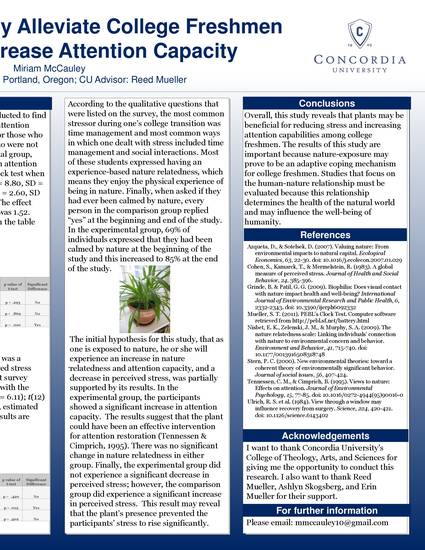
Presentation
Plant-Exposure may Alleviate College Freshmen Stress and Increase Attention Capacity
Western Psychological Association
(2014)
Abstract
Nature relatedness, which is the extent to which nature is a part of one’s identity (Nisbet, Zelenski, & Murphy, 2009), has been correlated with pro- environmental behavior and may contribute to stress-relief and cognitive restoration. This quasi-experimental study evaluated the effects of plant- presence on college freshmen perceived stress, nature relatedness, and attentional capacity. Twenty-six undergraduate freshmen at Concordia University were placed into the experimental and comparison groups with a matched assignment technique. The average age of the participants was 18 years; 96% (n = 25) were female, and 84% (n = 21) of the participants described themselves as non-Hispanic white. The results showed a significant change in attentional capabilities within the experimental group when comparing the first session (M = 8.80, SD = 7.16) and the second session (M = 2.60, SD = 2.22); t(9) = 3.25, p = .010. The effect size, estimated with Cohen’s d, was 1.52. In addition, there was a significant difference in the comparison group’s perceived stress scores when comparing the first survey session (M = 13.85, SD = 8.23) with the second session (M = 18.00, SD = 6.11); t(12) = -2.7, p = .019. The effect size, estimated by Cohen’s d, was -.802. The plant may have buffered the effect of stressful experiences and increased cognitive restoration within the experimental group. The understanding of nature relatedness is important as it relates to stress, health of humans, and the health of the natural world.
Disciplines
Publication Date
April, 2014
Location
Portland, OR
Citation Information
Miriam McCauley. "Plant-Exposure may Alleviate College Freshmen Stress and Increase Attention Capacity" Western Psychological Association (2014) Available at: http://works.bepress.com/r-mueller/40/
